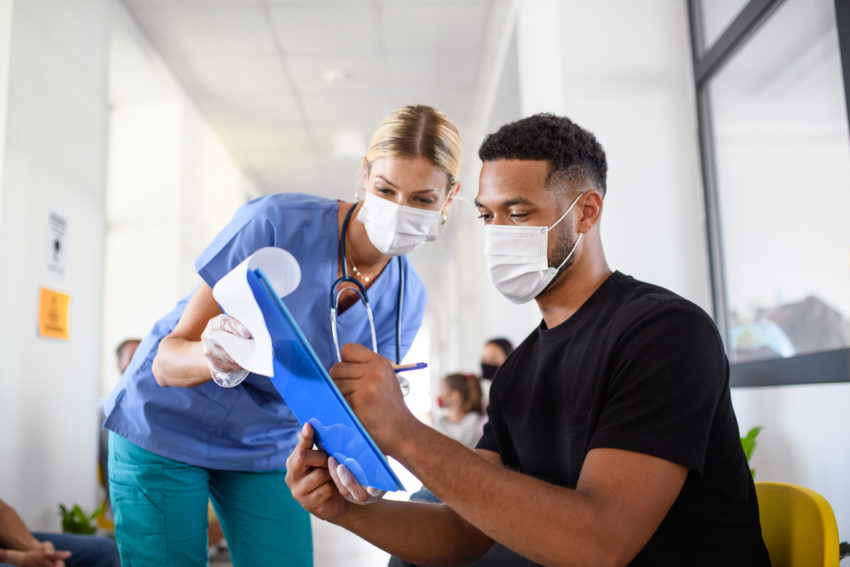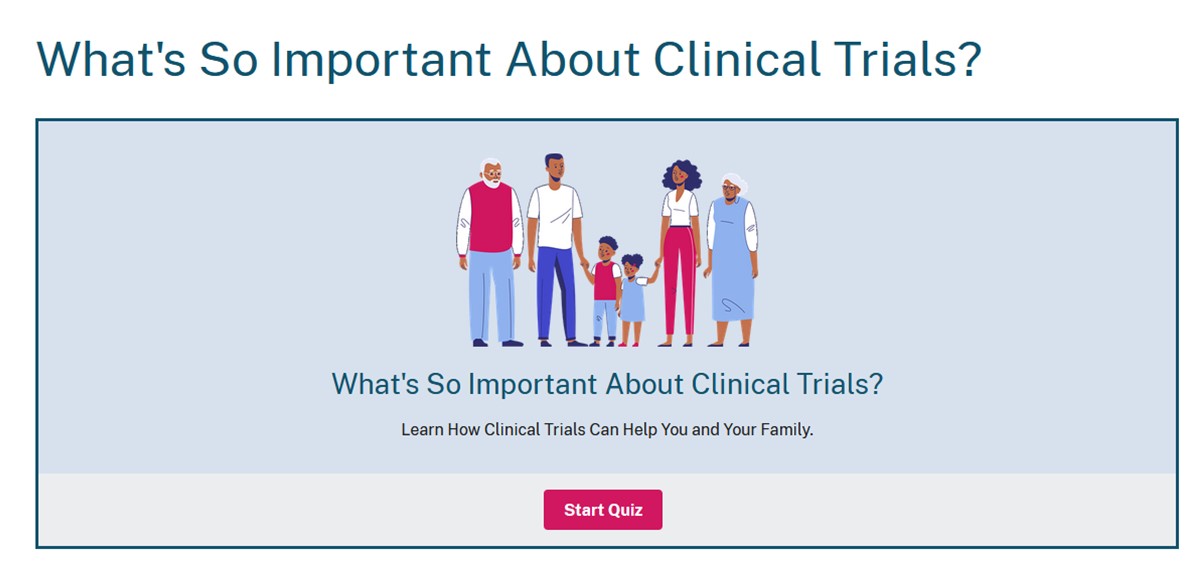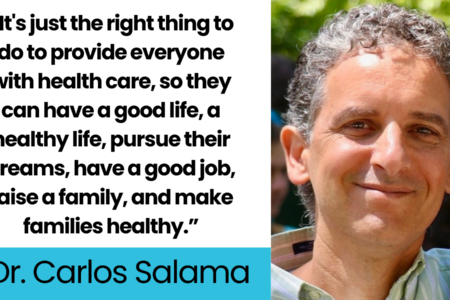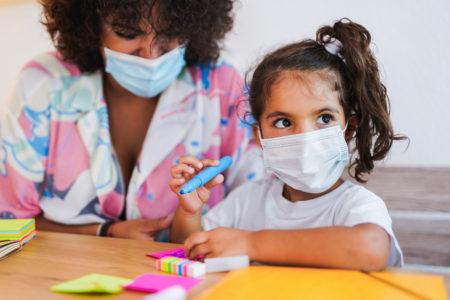
Share On Social!
Combat COVID is a federal education initiative to share bilingual information and tips about vaccines, potential treatments, and clinical trials for COVID-19.
A clinical trial is a research study to find a new treatment or achieve a better understand a disease.
In the case of COVID-19, which has overly burdened Latinos and Blacks, clinical trials need more participants of color to ensure that COVID-19 treatments are effective for everyone.
“Clinical trials are at the heart of many medical discoveries,” according to the team at Combat COVID, run by the U.S. Department of Health and Human Services. “[Trials] are the key to protecting our communities now and in the future.”
Let’s take a look at the work Combat COVID is doing.
Promoting Clinical Trails for COVID-19
Combat COVID is sharing information about COVID-19 clinical trails for these people:
- Adult patients who test positive for COVID-19 but are not hospitalized
- Adults exposed to COVID-19 but who did not develop the disease
- Adult hospitalized patients
- Adult patients discharged from the hospital
These trials are supported through a public/private partnership led by the Foundation for the National Institutes of Health—called Accelerating COVID-19 Therapeutic Interventions and Vaccines (ACTIV).
“ACTIV’s goal is to discover safe and effective treatments and vaccines for COVID-19,” according to the Combat COVID website. “The ACTIV and ACTIV-associated trials are testing monoclonal antibodies, antivirals, anticoagulants, immunomodulators, and convalescent plasma, among other [FDA-authorized] treatments.”
 Combat COVID has a quiz on why clinical trials are so important.
Combat COVID has a quiz on why clinical trials are so important.
The website also gives healthcare providers tips on how to refer patients for clinical trials and other opportunities to Combat COVID.
“Participating in a new clinical trial is vital for understanding the disease,” said infectious disease expert Dr. David Alain Wohl, in News 8 interview.
Combat COVID also offers hotlines in English and Spanish (24/7) to connect people to experts to learn about clinical trials for COVID-19.
“The information lines will help you to find out which study is right for you and which clinical trial is closer to your area,” Wohl said.
Why Latino Participation is Important for COVID-19 Clinical Trials
COVID-19 is worsening historical inequities.
The pandemic is disproportionately impacting and killing Latinos. Currently, Latinos are at high risk of contracting the delta strain due to low vaccination rates in Latino communities.
Historically and presently, Latinos are underrepresented in clinical research.
Researchers want to increase diverse participation in COVID-19 clinical trials to ensure that Latinos and other underrepresented populations benefit from new treatments.
“Many people of color have participated and are participating in the ACTIV clinical trials,” according to the Combat COVID website. “More participants of color are needed to ensure that COVID-19 treatments are effective for everyone.”
The diversification of clinical trial participants is a broader issue.
Dr. Amelie Ramirez, leader of Salud America! at UT Health San Antonio, is creating new ways to encourage Latinos to volunteer for cancer and Alzheimer’s clinical trials. A grant from Genentech, a member of the Roche Group, supports this work.
“Latinos in clinical trials are not only helping themselves, but they are also building a future with better treatments that can help their families and communities in the future,” Ramirez said.
What You Can Do in the Fight Against COVID-19
Be sure and check out the bilingual resources at Combat COVID!
Make sure you know misinformation when you see it and can help educate others about the facts on COVID-19.

If you or anyone you know is still hesitant about getting vaccinated, read these stories from real Latinos who had a #VaccineChangeofHeart and decided to get the vaccine after initially being against it.
In hopes of increasing awareness among Latinos and people burdened by COVID-19, the National Health Institute’s (NIH) Community Engagement Alliance (CEAL) Against COVID-19 Disparities Program created a new series of bilingual videos on clinical trials about vaccines and clinical trials to prevent and treat COVID-19.
You can also check out the “Juntos, We Can Stop COVID-19” digital communication campaign from Salud America! at UT Health San Antonio. This campaign helps Latino families take action to slow the spread of COVID-19.
The #JuntosStopCovid campaign features culturally relevant fact sheets in both English and Spanish. It also has infographics and video role model stories to encourage Latinos to change their public health behaviors.
Please share the campaign with your friends, family, and colleagues!
SHARE THE CAMPAIGN IN ENGLISH!
SHARE THE CAMPAIGN IN SPANISH!
By The Numbers
142
Percent
Expected rise in Latino cancer cases in coming years




[…] The pandemic is another chapter in the bitter story of American racism and inequality. Black and Latinx people are being infected and are dying at much higher rates than white Americans. Many people of […]
[…] coronavirus has killed over 61,000 Latinos in America according to the CDC, accounting for over 18.2% of the total COVID deaths in the […]
[…] Whereas Hispanics make up 11% of D.C.’s inhabitants, they signify 19% of the COVID cases, and 14% of the deaths. Equally, 46% of D.C.’s residents are Black, they usually make up an alarming 75% […]
[…] and historical mistreatment. According to the U.S. Centers for Disease Control and Prevention, Latino and Black American communities are three times more likely to become infected with […]
[…] Covid pandemic has hit the Latino community particularly hard, and data from the nonprofit health equity advocacy group Salud America! shows Latinos lead in the 0-24 age […]
[…] the pandemic, Latinos took major blows, both in terms of COVID-19 cases and also from the economic recession under former President Donald Trump. Nearly half (49%) of […]
[…] the positive trend, the harm may have already been done. The pandemic has disproportionately impacted Latino communities. Reuters reported that election-related or political disinformation that […]
[…] pesar de la tendencia positiva, es posible que el daño ya esté hecho. La pandemia ha impactado desproporcionadamente Comunidades latinas. Reuters informó que la desinformación política o relacionada con las […]
[…] residentes blancos muestran una tasa mucho más baja con 10 muertes por cada 100,000 habitantes(8 9) . Los afroestadounidenses por su parte, denuncian subsistemas de salud que les segregan […]
[…] https://salud-america.org/coronavirus-case-rates-and-death-rates-for-latinos-in-the-united-states/ […]
[…] https://salud-america.org/coronavirus-case-rates-and-death-rates-for-latinos-in-the-united-states/ […]
[…] communities have the second-highest number of COVID-19 cases in the U.S. They’re also more likely to become hospitalized and die from the disease than other […]
[…] total, around 160,000 Latinos were killed by COVID-19. This accounts for 16% of the 1 million deaths in the country. The […]